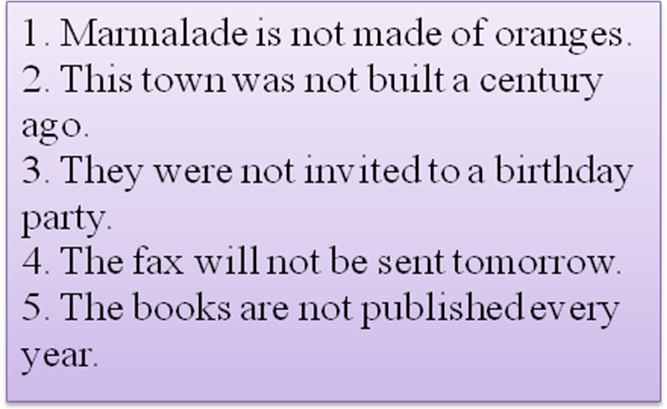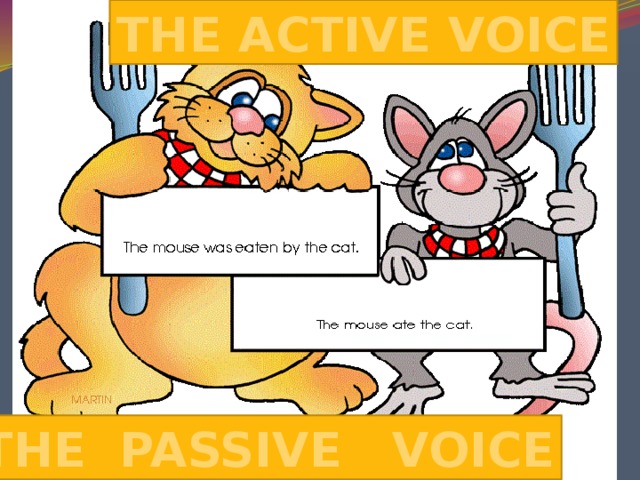
THE ACTIVE VOICE
THE PASSIVE VOICE

MEMO
Voice
Active Voice
Formula
Negative sentences (отрицательные предложения)
Passive Voice
Present Simple
Past Simple
Present Simple
Questions (вопросы)
Present Simple
Past Simple
Past Simple
Present Simple
Future Simple
Present Simple
Pronouns (местоимения)
Future Simple
Past Simple
Past Simple
Future Simple
Present Simple
Future Simple
Future Simple
Past Simple
Future Simple

Give the 3 forms of the verbs:
начинать
begin
ломать
began
break
забывать
знать
begun
broke
forget
учить
know
forgot
broken
forgotten
knew
learn
выбирать
known
choose
learnt
давать
chose
learnt
give
слышать
chosen
gave
hear
видеть
given
heard
see
думать
think
heard
saw
продавать
создавать
sell
seen
thought
thought
sold
make
sold
made
made
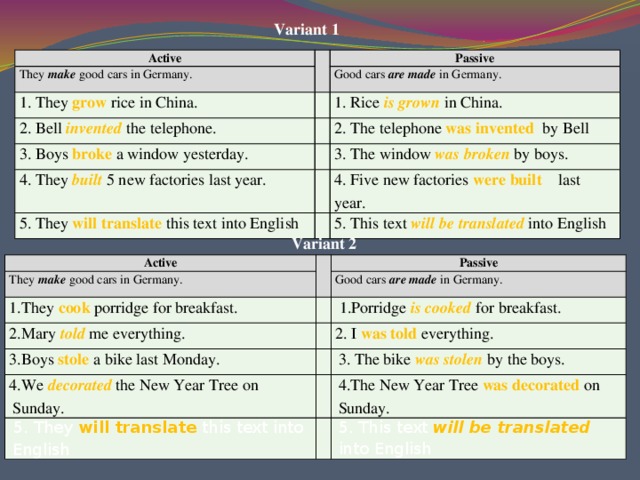
Variant 1
Active
They make good cars in Germany.
Passive
1. They grow rice in China.
Good cars are made in Germany.
2. Bell invented the telephone.
1. Rice is grown in China.
3. Boys broke a window yesterday.
2. The telephone was invented by Bell
4. They built 5 new factories last year.
3. The window was broken by boys.
5. They will translate this text into English
4. Five new factories were built last year.
5. This text will be translated into English
Variant 2
Active
They make good cars in Germany.
1.They cook porridge for breakfast.
Passive
Good cars are made in Germany.
2.Mary told me everything.
3.Boys stole a bike last Monday.
1.Porridge is cooked for breakfast.
4.We decorated the New Year Tree on Sunday.
2. I was told everything.
3. The bike was stolen by the boys.
5. They will translate this text into English
4.The New Year Tree was decorated on Sunday.
5. This text will be translated into English

Underline the predicate, say what tense is used and write out the formula.
Active Voice Passive Voice
1. Marmalade is not made of oranges.
1. They don’t make marmalade of oranges.
2. This town was not built a century ago.
2. They didn’t build this town a century ago.
3. They were not invited to a birthday party.
3. They didn’t invite them to a birthday party.
4. The fax will not be sent tomorrow.
4. They won’t send the fax tomorrow.
5. The books are not published every year.
5. They don’t publish books every year.
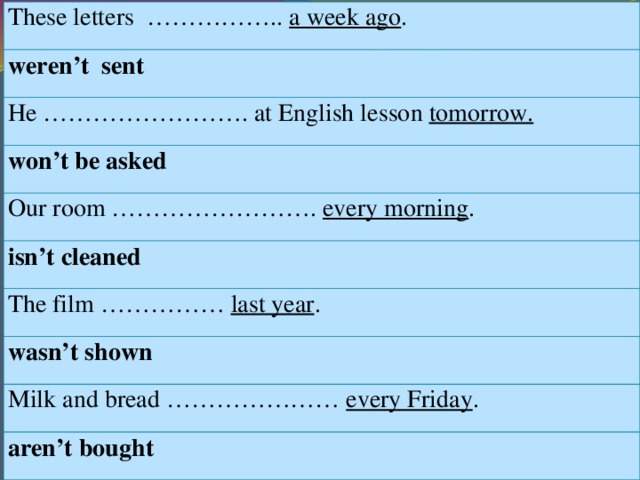
These letters …………….. a week ago .
weren’t sent
He ……………………. at English lesson tomorrow.
won’t be asked
Our room ……………………. every morning .
isn’t cleaned
The film …………… last year .
wasn’t shown
Milk and bread ………………… every Friday .
aren’t bought
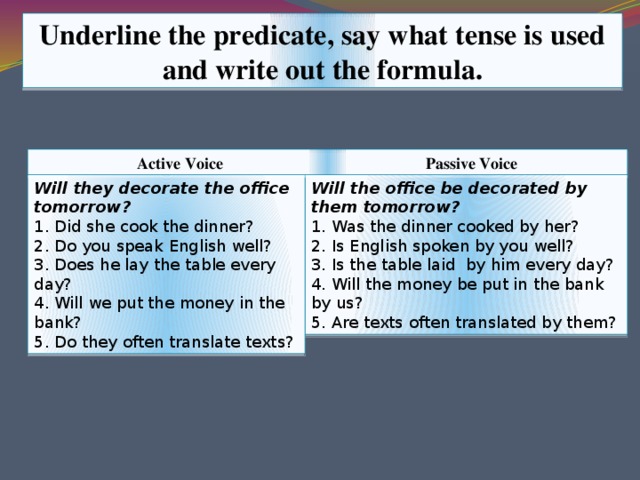
Underline the predicate, say what tense is used and write out the formula.
Active Voice Passive Voice
Will the office be decorated by them tomorrow?
Will they decorate the office tomorrow?
1. Was the dinner cooked by her?
1. Did she cook the dinner?
2. Is English spoken by you well?
2. Do you speak English well?
3. Is the table laid by him every day?
3. Does he lay the table every day?
4. Will the money be put in the bank by us?
4. Will we put the money in the bank?
5. Are texts often translated by them?
5. Do they often translate texts?

Now it’s time to ask the questions. I will read the sentences and name the special word. You will ask the questions to my sentences.
The flowers were planted last month.
( When were the flowers planted?)
( Where was the TV bought? )
The TV set was bought in the shop.
( What was built in 1991?)
The house was built in 1991.
( What language is spoken in Great Britain?)
English is spoken in Great Britain.
Cheese is made from milk.
( What is made from milk?)
The letter will be answered next week.
( When will the letter be answered?)

MEMO
Voice
Active Voice
Formula
Negative sentences (отрицательные предложения)
Passive Voice
Present Simple V, Vs
Past Simple V3 ed
Present Simple don’t/doesn’t+V
Questions (вопросы)
Present Simple is/am/are+V3
Past Simple didn’t+V
Present Simple Do__V?/Does__V?
Future Simple will+V
Present Simple isn’t/aren’t/am not+V3
Pronouns (местоимения)
Past Simple was/were+V3
I, you, we, they, he, she, it
Past Simple Did__V?
Future Simple won’t+V
Past Simple wasn’t/weren’t+V3
Present Simple Is/Am/Are__V3?
Future Simple will be+V3
Future Simple will be+V3
Future Simple Will__V?
Past Simple Was/Were__V3?
I – by me,you–by you,he–by him, she–by her,we–by us,they–by them
Future Simple Will__be+V3?

- Рефлексивная карта учени__ 7 класса _________________________________________
- Что я понял?
-
- Что я не понял?
-
- Какой вопрос мне хотелось бы задать?
-
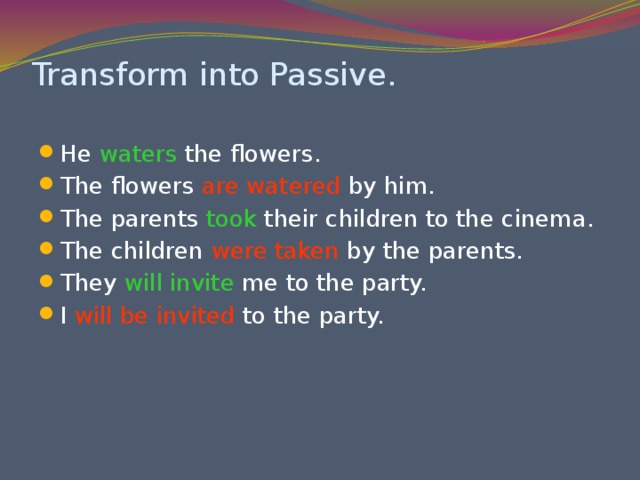
Transform into Passive.
- He waters the flowers.
- The flowers are watered by him.
- The parents took their children to the cinema.
- The children were taken by the parents.
- They will invite me to the party.
- I will be invited to the party.












